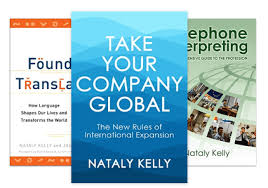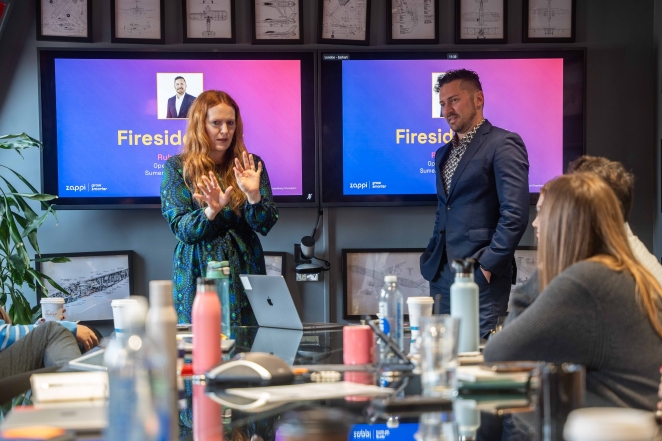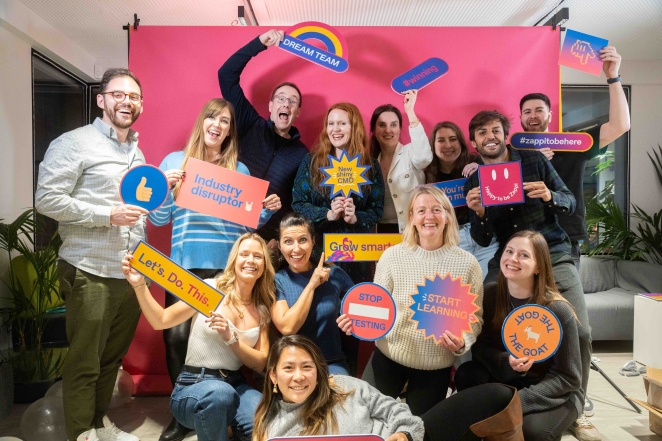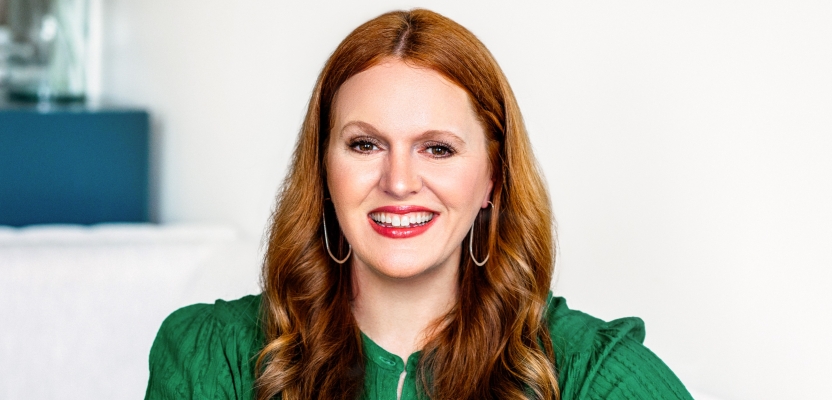Tell us a bit about your role! Is there a “typical” day?
I’m based in Boston, and I generally start my workday rather early, by checking in with our Zappi teams in Europe. We begin each day with a daily virtual stand-up in our marketing team Slack channel, so that’s usually the first thing I look at, cup of coffee in hand. I get my kids off to school, and then my morning is usually full with meetings across time zones until lunchtime. I usually block time in the afternoon for deeper work.
Once a week, I also go into our beautiful office in the Boston Seaport district to get face time with my colleagues and boss. While I love remote work, nothing can replace spending time with people in person. I also love visiting our London office, where most of my creative team sits.
What was the biggest challenge in getting to your current position?
Recency bias can be hard to fight against! When I was looking for a CMO role, some exec recruiters glossed over my experience in marketing and viewed me narrowly as an “international” specialist. While global business is definitely a passion of mine, I led marketing teams at three different tech companies before my current role, including at a large public tech company.
I think it’s important when evaluating exec talent to be able to look past just what a person is well-known for, and to look at the specifics of what a company really needs to round out its leadership team. Fortunately, the team at Zappi saw my combined experience in technology, marketing, global business and market research as a great fit for what the company needed at this particular juncture.
What is your personal background and what role did it play in your career?
I grew up in a small farming community in central Illinois, with cornfields outside my window. I had big dreams of seeing the world. Reading and writing were my only real links to a life outside of my small town.
As a child, I had pen pals all over the world. I entered essay and poetry competitions in the hopes my writing would connect with a wider audience. In fact, my first trip on an airplane was when I was in high school, thanks to a prize I won for winning a writing competition.

All these years later, writing and connecting people around the world remain very important aspects of my life. I’ve published three books, I have a blog, and I write a weekly newsletter called Making Global Work.
I have a lifelong passion for connecting people, brands, and businesses across barriers of language and geography. I believe in the power of the written word, but especially when combined with the right creative, to inspire and delight. I’ve built my entire career around that passion, and it’s what fuels me every day.
What is your biggest career-related win? What is your biggest loss?
My biggest career-related win is seeing people I’ve mentored go on to achieve great things in their own careers. I’m proud to say that many of the people who reported to me have gone on to VP roles, CMO and even CEO roles at other companies themselves. Even when they leave my team, I never stop cheering them on.
As for my biggest loss, it’s the inverse. Like many people working in technology in recent years, I experienced the heartbreaking loss of finding out many of my own team members would lose their jobs overnight. I felt powerless at first, but poured my energy into helping them find jobs, using my network and supporting them. They all landed in new roles eventually, but that was a devastating moment of loss for me that I hope I’ll never have to repeat.
Which individuals and/or agencies do you gain inspiration from? Do you have any heroes in the industry?
I am most inspired by my own team at Zappi! These heroines and heroes have created a beautiful and distinctive brand identity for Zappi, one that is totally unique, vivid, and very special in my opinion. You don’t see many tech companies with such a compelling brand. I am excited to see what they come up with next. They’re incredible!
I’m also inspired by the creators and makers from within my own family. My sister is a pianist and a music teacher. My mom and older brother are both painters. Both my brothers write music and have multiple albums (blues and acoustic guitar for one; rap and hip-hop for the other).
My niece is an actress and musician living in New York who did a degree in dramatic arts. Another niece is doing her university degree in jazz music. With so many of us involved in the arts in my family, we never stop talking about creativity, but especially related to music.
If you could go back to your teenage years, would you have done things differently? Do you have any regrets?
I am generally very future-focused and don’t tend to think in terms of regrets but rather in terms of lessons learned that I take forward with me. That said, the teenage years can be very tough. I was a couple of years younger than the average age for my class, which came with its challenges. I didn’t have friends to sit with at lunch, so I went to the music room every day instead, playing piano and getting lost in my songwriting.

I can’t say I regret that; however, it’s a part of who I am and made me realize that when times are tough, the arts are a perfect way to express the range of emotions we experience as humans. That’s my lesson learned, that sometimes negative emotions can be powerful catalysts to help you tap into the depths of your own creativity.
If you weren’t in your current industry, what would you be doing?
I would be a full-time writer. There is nothing I love more than writing, but a close second love is travel. I love learning new languages, experiencing new cultures, seeing new places and their various forms of expression in music, arts, textiles, architecture, cuisine. Give me a laptop and send me out into the world, and so long as I can be with the people I love, I could not be happier. I also love writing music, so I would be doing more of that too.
What’s your one big dream for the future of the industry?
Connectedness. I believe there is so much untapped potential in building networks, sharing ideas, and learning from each other. This is why I’ve always been drawn to technology, and it’s a huge reason why I love working at Zappi. Our platform enables creators to leverage the best data and insights in order to produce their very best work, and for that body of work to get better and better over time.
What are your top tips for aspiring creative professionals?
Don’t be fearful of AI. There is so much chatter and fear mongering about AI replacing humans, but I have a much more positive take. I spoke with the futurist Ray Kurzweil to ask him about his take on technology replacing an entire profession.
When he invented the Kurzweil keyboard, and double-blind tests showed that the sound was indistinguishable to the human ear from that of a grand piano, musicians were up in arms and fearful that their entire profession would die out. In fact, it did not die out, and electronic music gave rise to a whole new era with new jobs that didn’t exist previously, in digital recording and sound engineering especially.
Not everyone can afford a piano, but most people can afford a keyboard. His invention opened up access to entire parts of society who could not have been involved in music otherwise. I think the same is true of AI. People now have more power in their hands to achieve their creative visions. It’s natural that creative professions will evolve, but this has already been happening with technology now over many decades, and not something that we should fear.
What are your top tips for other creative leaders?
Harness the power of systems and processes to enable your teams to do their best creative work. Sometimes, creative folks bristle at the idea of being systematic about our work, but I find that if we can provide structure, this is actually an enabler of creativity and can take boring routine decisions out of the way, allowing people to focus on the things that matter instead. Make it easy for them to have space to flourish by providing stability.

At Zappi, I introduced a marketing team “operating model” which we call the “OM,” accompanied by an emoji in a yoga pose. It’s a simple idea, just a couple of pages that outline how we work as a team. To me, we can only achieve a zen-like state where people feel relaxed to do their best work if we are organized and give people a baseline framework that supports them.
When you think about your team, what is the thing that matters to you the most?
Productivity. I think people feel best when they are producing things and moving projects forward, together as a team. Truly creative people get bored doing the same things over and over, so one of my goals as a leader is always to keep people moving onto the next thing and not letting projects percolate or stagnate for too long, harnessing the skills that each person brings to the group.
My goal is always for us to deliver high-quality work that we can be proud of, but keeping to a schedule and consistently meeting our targets matters too. Having a prolific and dependable creative team is important when the rest of the business is relying on you. For a team to feel proud of their work as a collective group, I think it’s important for us to look back and say, “Wow, what we delivered was impressive, in both quality and quantity.”
You can only do that by creating a positive culture where people feel safe to take risks and experiment, while building an environment of transparency and accountability to engender trust.
Do you have any websites, books or resources you would recommend?
I took a course by Edward Tufte more than 20 years ago that was a game-changer for me, and I’m a big fan of his books, including Beautiful Evidence. He is passionate about making quantitative information visually compelling, and I still rely on many of the principles I learned in that course.
I’m also hugely inspired by music, and films about musicians. Two I highly recommend are “Summer of Soul,” a documentary about the 1969 Harlem Cultural Festival, and “20 Feet from Stardom,” a film which puts backup singers in the spotlight. I also enjoyed reading Creativity Inc by Ed Catmull. He talks about the importance of not just generating, but nurturing creative ideas, and I believe this book is fundamental reading for anyone who leads a creative team.




